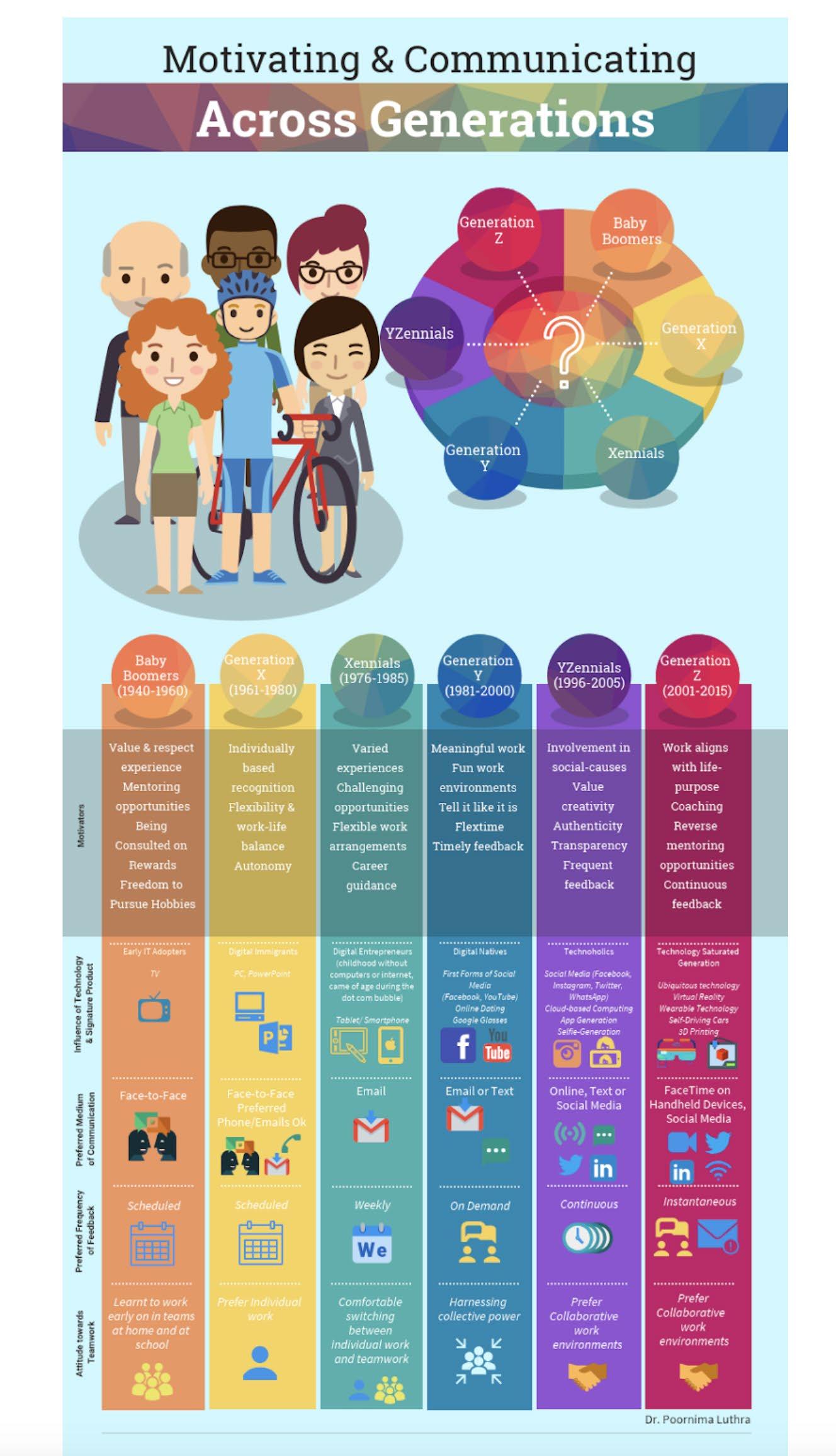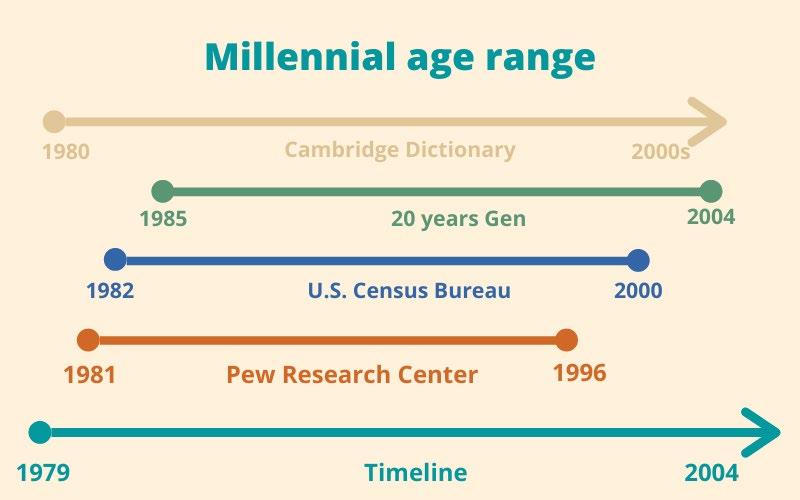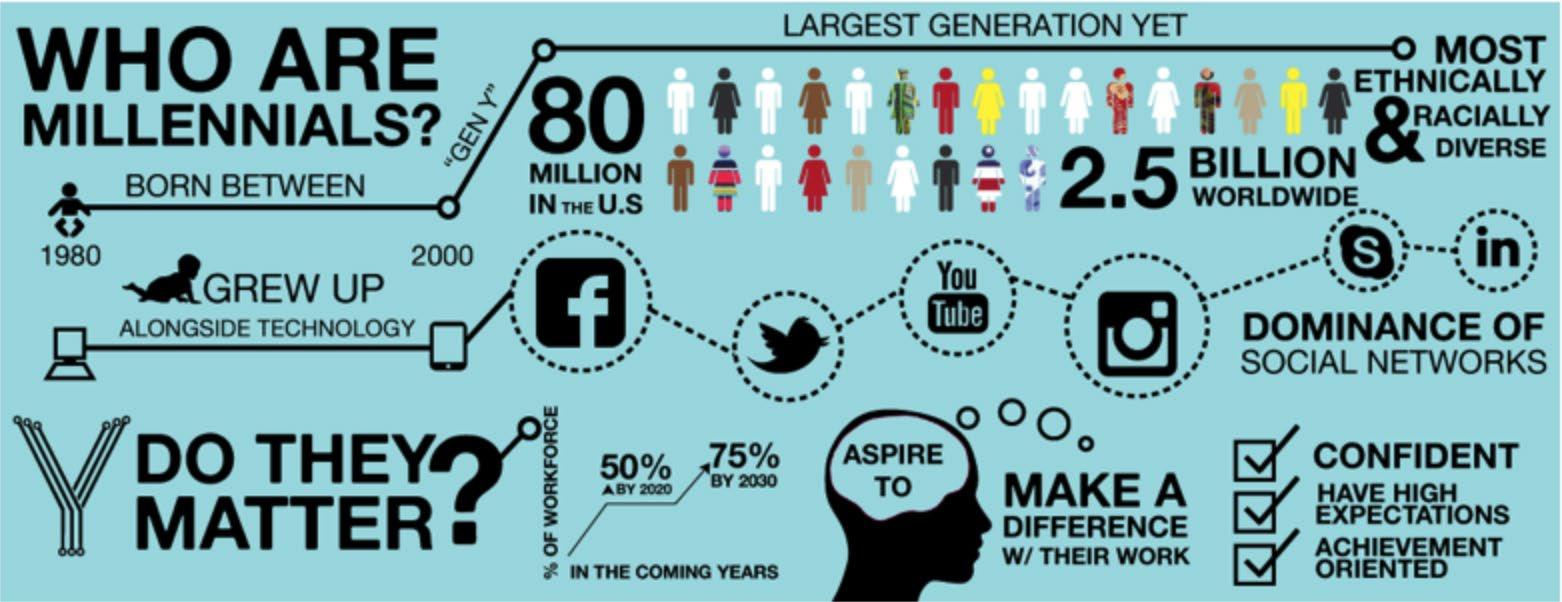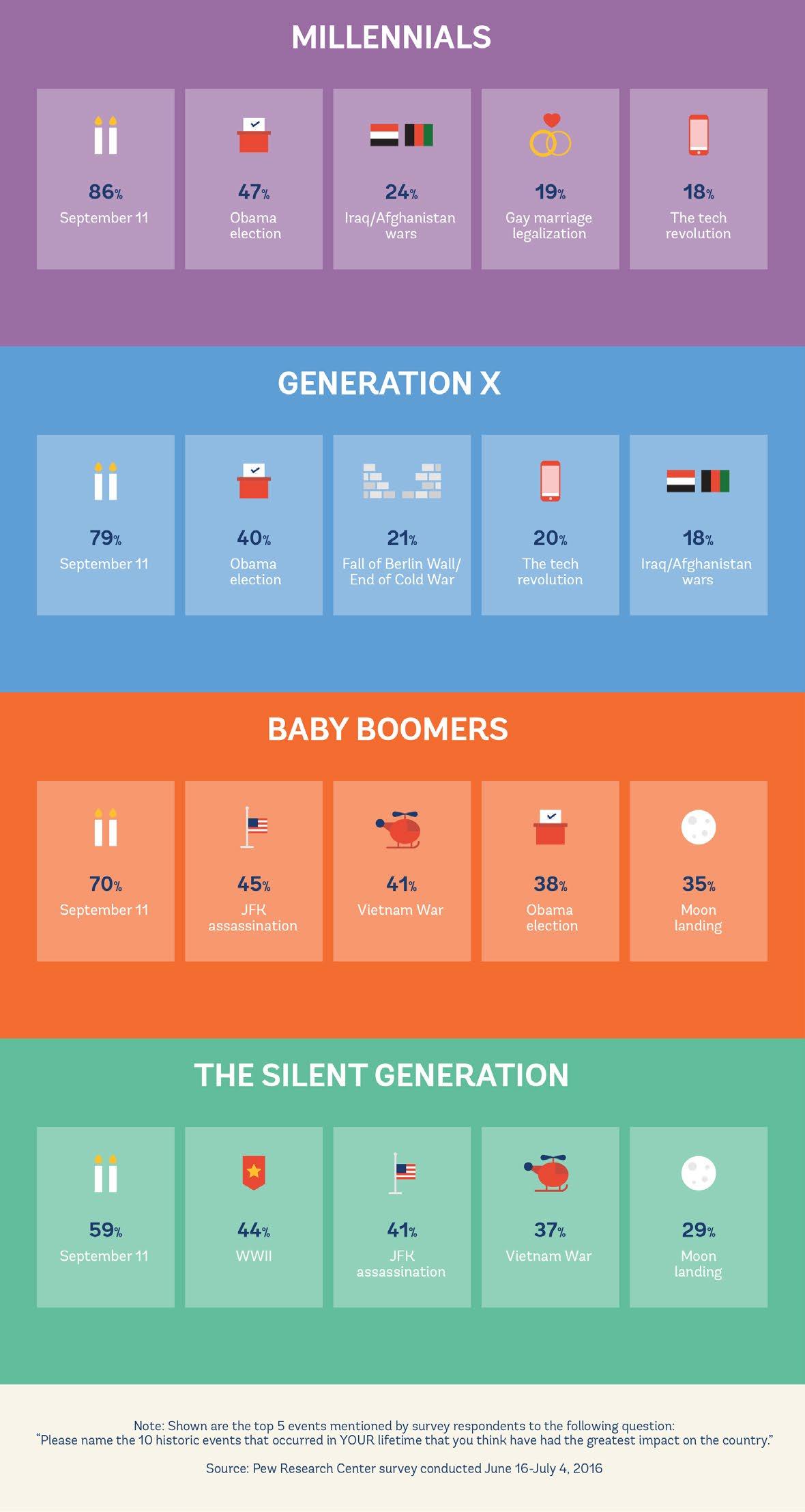
9 minute read
Understanding Millennials 04Introductory Essay
from Thesis Research Book
by Thea Seno
What’s a generation? Why is it that an extra step is taken to define a group of individuals, dividing them by the years they were born, all the while connecting them to the most memorable historical events of that decade Could this be one of the reasons why each generation is so easily associated with certain characteristics and beliefs? Do certain social transitions and norms contribute to defining these individuals, further dividing the generations not just by age, but by ideals and actions as well? It's safe to say that yes, all the different aspects of life can certainly affect the development of a generation Each shared experience groups people together with various examples all throughout history as to how the domino effect takes place from event to individual. Maybe this well help in the understanding of the common millennial, what the reason is behind their values, mindset, and characteristics, and how society affects the milestones of their lives.
To help bring some light to the present-day generations, a timeline might be necessary Moving all the way back from the 1900s to 1920s, the Greatest Generation was born. The term “Greatest Generation” derived from a title of a book written by Tom Brokaw who was a journalist for NBC. The book was written to explore the various stories and characteristics that make up the generation and why it was considered “The Greatest Generation”. Some answers to this question were because as a collective whole, they had an intense drive to contribute, build, and take care of society They took lead in enlisting and defending their country during WWII, stepped up in order to fulfill contributing rolls, prioritized rebuilding the community, and created economic opportunities Following the devastations of World War II and the Great Depression, this generation had to learn resilience in problem solving and surviving hardship Some characteristics they learned through this was personal work ethic, humility, personal responsibility, frugality, humility, self-sacrifice, integrity, and commitment.
Advertisement
Loyal, respectful, determined, and thrifty were words that spoke volumes about the generation following right after Ranging from the years 1928 to 1945, the Silent Generation also experienced the hardships of going through the Great Depression and World War II. “Radio Babies” and “Traditionalists” were terms that were used to describe this age range. Significantly smaller than the previous and next generations, the people during this time weren’t as secure in starting a family and raising children. Since life started during such difficult times, this led to a more cautious and more compliant generation, hence why they were called the “Silent Generation ” The events that surrounded them forced them to submit to laying low In which they surrendered themselves to the rules of that time They had tremendous respect for authority and valued stability, not challenging the circumstances of the time until the civil rights movements occurred, which opened up social opportunities and transitions for the future.
Following the war, the “Baby Boomers” emerged, becoming what had formerly been the largest generation in history A tremendous spike in birth rates post war allowed for nearly 3 4 million babies during 1946 and continued to trend by the millions up until 1964 People during this time started to feel more secure in starting families and creating a better life for the future, compared to the Silent Generation, all because devastations from the war and the Great Depression were finally settling down. Baby Boomers are considered to value the time spent with family and friends, valuing relationships They’re self-assured, confident, and were raised around a time that valued the American Dream and it made the generation very goal oriented This generation was also around the time where the Civil Rights Movement made its mark in history, while being a part of other moments in history where technological advancements started to take hold, allowing them to adapt easily and learn to be resourceful. This generation was just the beginning of technological advancements like television, smart phones, Wi-Fi, etc.
From 1965 to 1980 an independent generation arose when a women’s presence in the workplace was widely accepted, which meant both parents left to go to work They were known as the latchkey kids, post-Boomers, or better yet, Generation X, because they learned independence rather early and refused to be defined, aligning with the reference to the variable “x”. They were born during a shift into a world towards technology. This generation grew up during the development and introduction of the modern computer and space technology and exploration Their independent nature allowed for the exploration of that work-life balance, compared to the Boomers, and were freer spirited when it came to entrepreneurial opportunities Post-Civil Rights also allowed this generation to grow up with the beliefs of equality and the importance of diversity, never knowing life without them Every considerable event in each point of history shapes the generation revolving around it from adapting to certain circumstances to education and social beliefs. The consideration of social influence on the individual would allow for a better understanding of the characteristics of each generation as a whole.
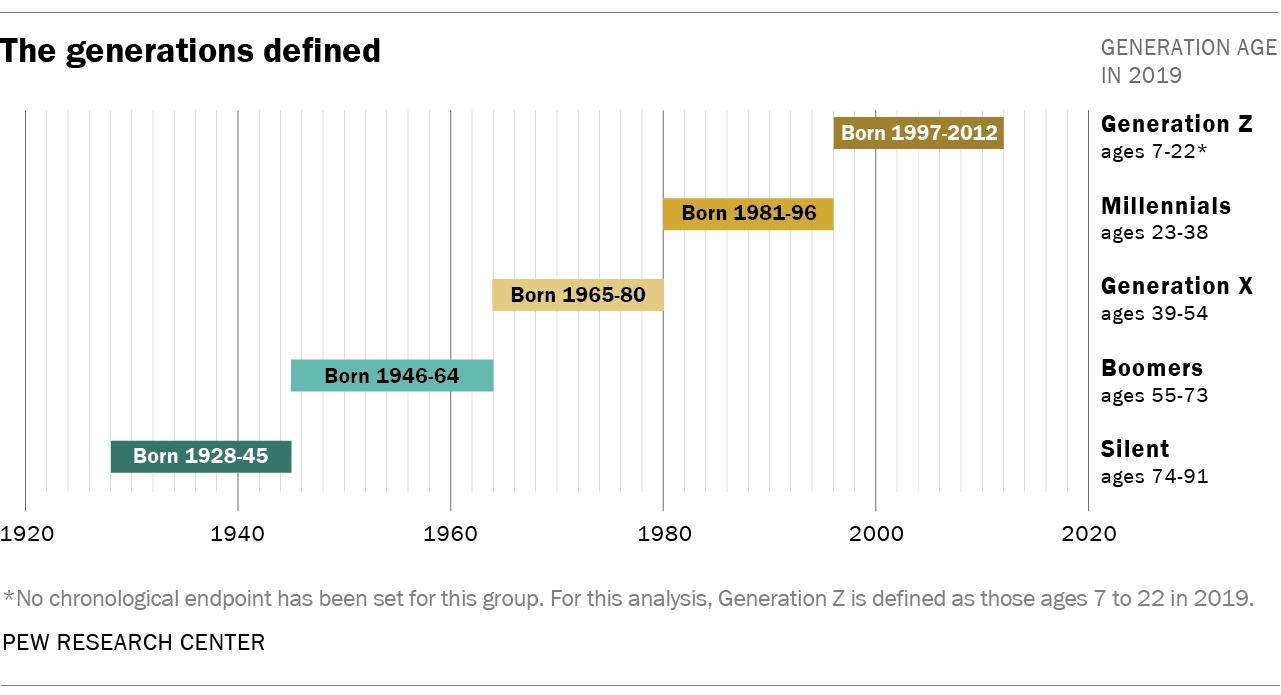
To introduce the average millennial, one has to understand the age group to completely be in the mindset of the generation As a millennial, one has to have been born from the years ranging 1980 to 2000, or according to Kasasa, 1981 to 1996 So, with that information and depending on the source, millennials can range from early 20s to 40 years old This can help put things into perspective in where they are in their lives, where people expect them to be, and maybe even help put some perspective on their mindset and what got them there. The sheer size of this generation is also a shock when first letting it sink in. Nearly seventy-eight million births happened between 1980 to 2000, making this age group the largest generation and completely impossible to ignore, especially now when they’re experiencing such important times of their lives At this time millennials are well in their journey of still figuring out who they are, who they want to be, and planning how they want their lives to pan out, taking the level of independence from Gen X and heightening it ten times over They’re experimenting, taking milestones, and shifting the world itself culturally, socially, and mentally.

Who are millennials? They were considerably the first generation to really be affected with new technological inventions during childhood and teen years This is the generation where the internet took over all aspects of social life Prior to that, this was really also the last generation to remember life before video games and Wi-Fi They were the last to experience a childhood of playing outside, barely having any exposure to the world of technology, not compared to now. Possibly the last for chalkboards, VHS tapes, and renting DVDs to watch for movie nights. While this experience might not apply to every individual, it is one of the most universal feelings that are expressed throughout, ironically, the internet Children now a days can’t go without the technology that's so easily accessible right in their fingertips With modern technology at their disposal, social media can provide access to completely take over the control of their ideals and perspectives Now, with the youngest of millennials at adult age, it’s safe to assume that they too are engulfed in the same technology web as their younger counterparts.

Millennials have been put into a major transition period that forced them to adapt to social and technological change, affecting how they’re considered as students and employees With the idea that life isn’t steady but an ever-moving train, millennials had learned to jump on, and that staying back meant the possibility of losing their future They took control of the situation and created opportunities for businesses and education Now that every tool was so easily accessible, doing things the hard way never seemed so obsolete If there’s a way to make things simpler, a better way, a faster way, millennials would take advantage of that Older generations focused on the importance of hard work compared to the notion of “work smarter, not harder,” in which Gen X’s independence and work passion had been passed down. Hard work is important, yes, but it’s easy for someone to say that younger adults are lazy and entitled when in reality, they’ve accepted and adapted to change far better than the ones making those statements.
It also makes them risk-takers because they understand that change is inevitable What was once a society where an individual would place themselves in one position to pay for their mortgage and would stay for the rest of their lives changed to a society where this loyalty isn’t set in stone and the prices of living have surpassed past years immensely. They saw what life used to be like. Get an education, go to work, pay off debt, and then what? They’re an age that understands the importance of work, but also a generation that questioned if this was all to life when society produced the means to not make it so. Technology made room for the growth and potential of what an entrepreneur could be considered today, where working from home or anywhere in the world became possible Since change is inevitable, why not be happy in the process? They refused to be a part of the steady work life that previous generations have forced them into, not when working can also mean living, not just the means to live
This gave them a strong incentive to pursue passion and make the most of the time they have while knowing that anything can happen in an instant. It’s also what makes the younger adults so open-minded, because they emerged during a time where many possibilities took place that were not always possible However, it led to more anxiety and depression because even though they jumped onto the moving train, it doesn’t mean that they’re not affected by the fast-paced environment This is the reason why younger adults are so much more focused on the wellness of the individual, because they understand that they’ve been put into a difficult situation where it’s hard to catch up Their wellbeing is always being evaluated by their family, peers, and their hardest critics, themselves That’s why younger adults are more into the elevation of the self through activities like meditation, yoga, holistic healing, and understanding the self-worth. Especially when the world was forced into isolation.
Turning to more recent events concerning the COVID-19 pandemic, this was just one more thing added to society that negatively affected all aspects of life for everybody People are naturally attracted to some form of social interaction, so when the world was put into lock-down, the mental health of individuals decreased rapidly, statistically speaking, the younger generations more so than the older ones Younger generations are especially prone to being easily affected in a psychosocial nature since they’re still going through such rapid changes in society. The following charts show those exact psychosocial characteristics being measured with PROMIS Patient-Reported Outcomes Measurement Information System.


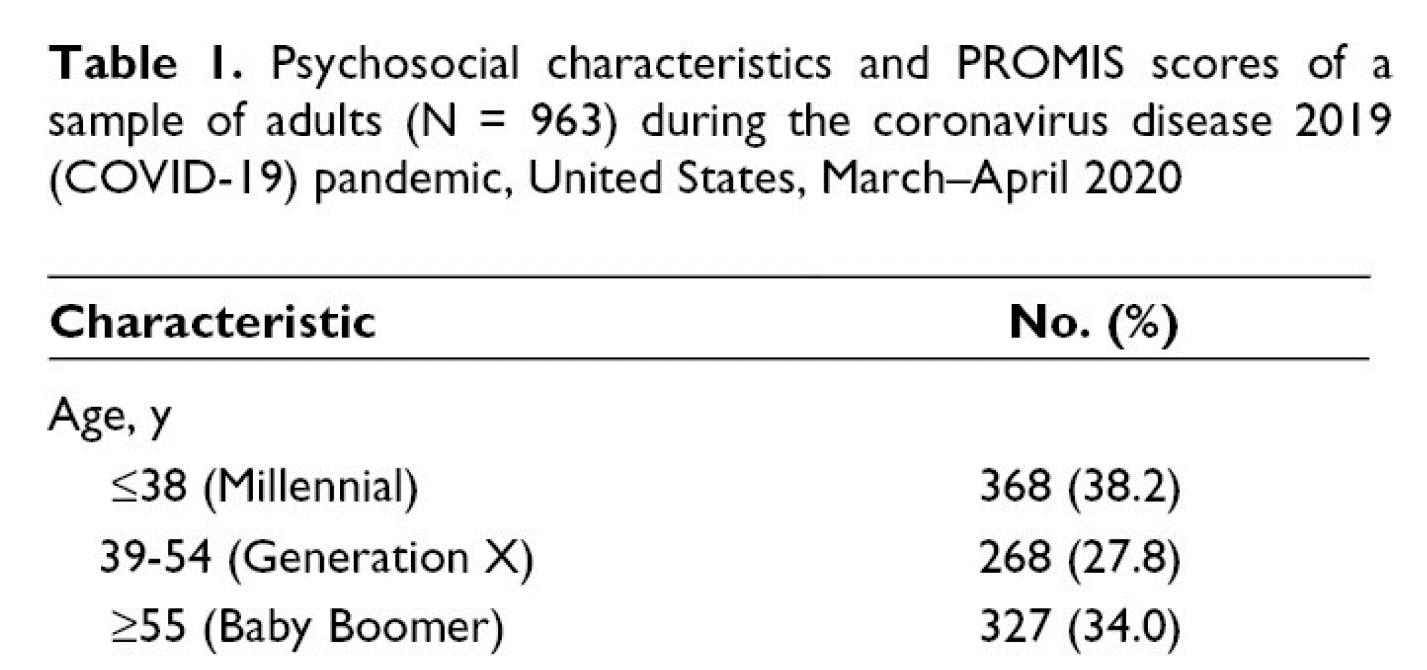
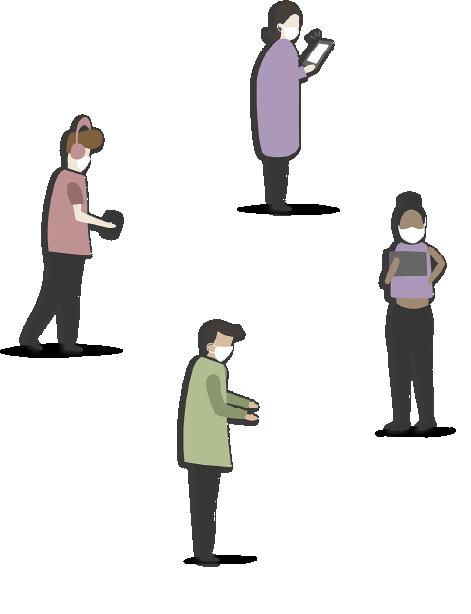

Prior to COVID, millennials were well in their way to changing the work environment. More group focused, they were moving towards more collaborative methods and using transparency in the office. Group work became a staple in the younger generations, leaning towards connectivity and spatial thinking. Interaction was critical, in fact, encouraged in the workplace to speed up solutions, and increase employee engagement, motivation, and satisfaction This type of relationship and community in the workplace gives the individual a sense of purpose, making it easier to open up the mind to different perspectives and ideas to creative innovative solutions efficiently Stress on the individual is lifted and contributes to their growth, development, and can contribute to a positive outcome on the individual’s well-being
Post-pandemic, it’s important to realize that humans need that interaction back It’s not the same to collaborate and explore ideas behind a computer screen Especially when millennials were well on their way to inspire social and perspective changes They can’t go from going on their way to experiencing some of the most momentous points of their life, to being isolated and lonely, and then not having a safety net to fall back on after the pandemic subsides It’s put a setback on the progression of such a pivotal time of their lives and made it difficult for young adults to find motivation in their education, work, and social and living solutions, which as seen above, tremendously affected their well-being It’s a bit taunting and difficult when the sense of community is taken away from them and they can’t experience the same freedom and milestones that other generations had gotten the chance to.
Millennials are the generation that may be the last to experience real childhood freedom and one of the first to get some of the most pivotal moments of their life taken away from them Society changes have impacted every individual of all generations but none more rapidly than young adults. Being raised in the consumption of the digital world allowed them to adapt easier to change, in fact, encourage it in all aspects of life. They became independent, more open-minded, and were put into a situation to learn to accept the rapid society changes and fast-paced lifestyle, which is why many young adults focused on self-worth and how to elevate the individual in order to create a productive community. The focus of collaborative work became prominent and growth as a community became a safety net until the pandemic affected all of that. Now young adults are at a standstill, hoping that not every momentous occasion in their life can be so easily taken away this time However, it’s important to bring back the development of the self and the community, especially when millennials still have the opportunity to continue and inspire change It’s time to hop back onto the train and move forward
